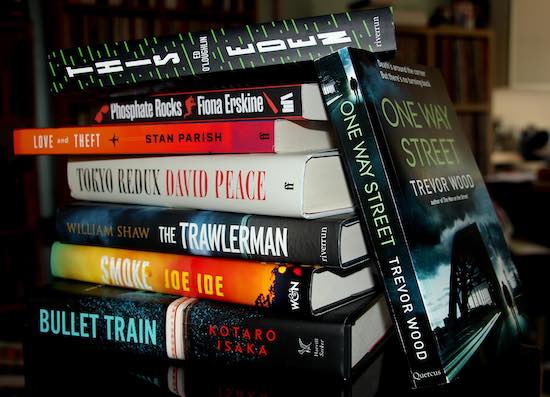I expect you’re wondering why we’ve gathered you here today…
…Welcome to what we’ve decided, via the deliberations of a small committee, to call Burden Of Proofs: tQ’s new bi-monthly crime fiction column. For now this is just me, but by the time we reconvene towards the end of July, there’ll hopefully be more contributors. The plan, at the moment, is to highlight recent and imminent books we’ve enjoyed, rather than waste space and time giving a kicking to ones we haven’t (as tempting a course of action as that often can be). The other guiding principle will be to avoid spoilers at all costs, which means that we’re going to try to write about the writing and the effect the author achieves, rather than spend half the space outlining the plot.
Rules, of course, are made to be broken (after all, we’d have nothing to write about if nobody was interested in laws being trampled underfoot), so we not only reserve the right to change our minds on all this in future, it’s also possible we’ll fail to reach these goals from the start. That’s for you to judge.
If it’s difficult to find an original character to build a series around, it may be even harder to turn a debut success into a follow-up hit. Trevor Wood admits as much in the afterword to One Way Street (Quercus), the second outing for his inspired creation, Jimmy Mullen. Elements of Mullen’s back story cleave pretty closely to the ideal thriller-hero template – ex-military, largely estranged from friends and family, lacking the usual roots of home and hearth that would become exploitable vulnerabilities in the hands of the most determined adversaries – but unlike Lee Child did with his quasi-mythic Jack Reacher, Wood has chosen to make Jimmy homeless in a way most readers will more readily recognise as real.
As we join him here, Mullen’s probation officer has helped him find a room in a hostel, but his day-to-day life still revolves around the Newcastle drop-in centre familiar from 2019’s The Man On The Street, where a sharply drawn cast of street-sleepers meet, eat and, in their own ways and to the best of each of their physical and psychological abilities, look out for each other. Wood is a graduate of the University of East Anglia’s crime fiction MA programme – a kind of Brits School for aspiring thriller writers – so nothing in structure or technique is ever less than assured. But you sense it’s his time volunteering at The People’s Kitchen, the real-life equivalent of the centre he’s placed at the heart of these novels, that gives his writing its heft. The story is arguably stronger than last time, and Wood is careful to prepare his battlefield for future instalments – the introduction here of a support group for veterans surely sets Jimmy up with an investigatory network he will come to rely on far more heavily in book three and beyond – but what stays with you is the world Wood draws you into so completely and compellingly.
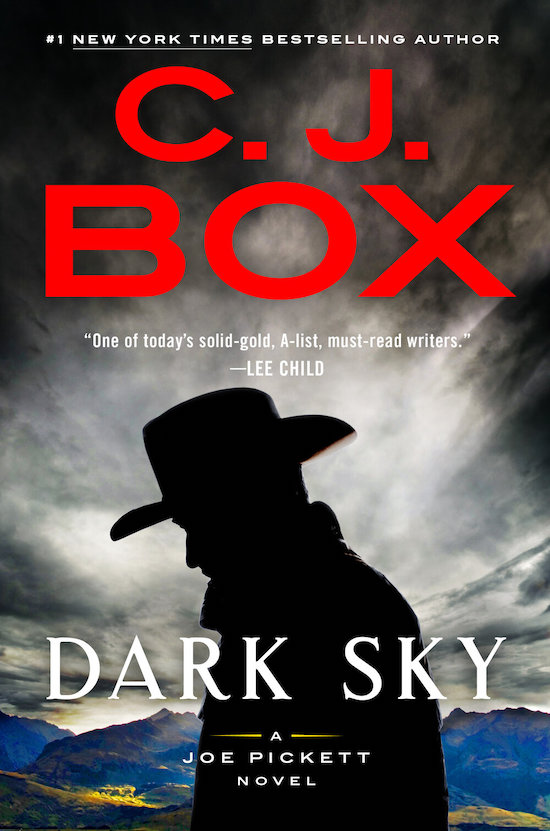
One writer who’s found a balance between reinventing and repeating with a singular series character is CJ Box, whose Dark Sky (Head Of Zeus) marks the twenty-first appearance of Wyoming game warden Joe Pickett. Box made a series of inspired decisions twenty years ago when he created Pickett in Open Season: a game warden has some legal powers but not as many as a police officer, Pickett is a poor shot so firearms don’t really help him when he’s in a tight corner, and his day job brings him into close contact with rugged individuals often scraping by on the fringes of polite society to whom tracking prey across inhospitable terrain is second nature. Just as inspired was giving Pickett a young family that readers have followed down the years from kindergarten to university and beyond, while another apparent choice – to eschew America’s polarised politics without ignoring it, giving plenty of time to voices from across the rural/urban and progressive/conservative divides – has enabled him to give the books a topical resonance many thriller writers strive for but never reach.
The series has fluctuated in quality, though only slightly and never below an unusually high standard – even more remarkable considering that in that twenty years Box has also found time to write several standalones, a short-story collection, and a four-book series about investigator Cassie Dewell that producer David E Kelley has turned into the TV show Big Sky (available for streaming in the UK via Disney+).
This latest Pickett outing is one of the very best, its central theme the necessary but often uncomfortable coexistence of the lifestyles and traditions of the old west with twenty-first century mindsets and technologies. This is something Box often aims for – and, from a writer as careful and as nuanced, this always means much more than giving some ranch hand an Instagram account and a GPS receiver. Here, the narrative involves a social-media billionaire using a hunting trip to burnish his public image, and a family destroyed by a teenage suicide linked to that social network. As always, the vast Wyoming wilderness is conjured in vivid, spare prose. Regular readers will enjoy playing Pickett bingo (will he total another state-owned vehicle? Will his ex-special forces friend, falconer Nate Romanowski, do terminal damage to some over-confident miscreant with the largest production handgun on the market? Will Joe rely on his unflappable librarian wife Marybeth to look up stuff for him on the internet? Will there be a moment of calm before the story’s defining storm inside which Pickett will warn his antagonists that unless they back down, things are “about to get Western”?). Box also brilliantly situates his narrative in our post-pandemic world, a couple of matter-of-fact asides about mask-wearing dropped in to emphasise that Pickett inhabits the same reality as the rest of us, but without ever belabouring the point.
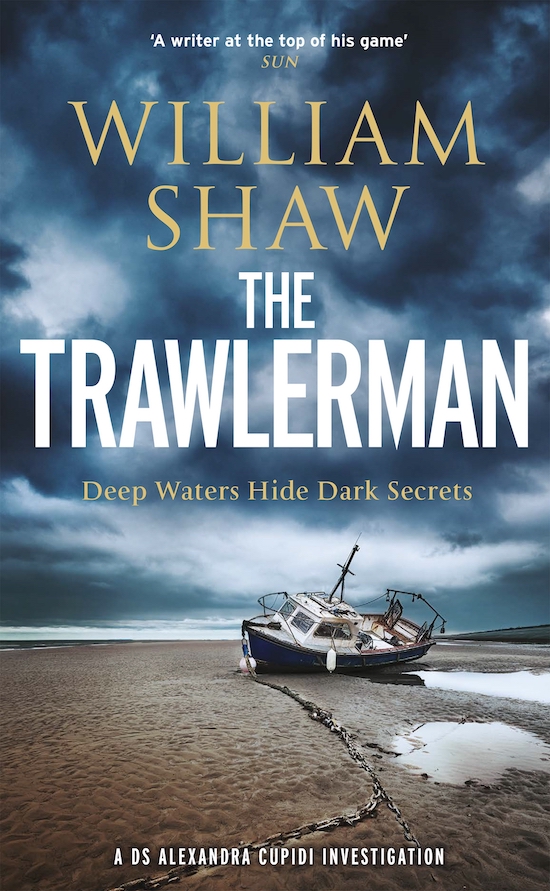
Another writer with a similar interest in – and talent for evoking – the wide blue yonder is William Shaw. The Trawlerman (Riverrun) is the fifth book he’s set on the south coast of Kent, where detective Alex Cupidi and her daughter live in the shadow of the nuclear power station at Dungeness. Shaw – formerly a music journalist – has a similar knack to Box for choosing the optimal number of just the right words to conjure up those vast, empty spaces. These books are full of big skies looming heavy over low, flat horizons; place and space a character drawn as adroitly as any of the human beings, landscape and geography always much more than an enveloping background.
For some reason, the first book to feature Cupidi and be set in the same locale – 2016’s The Birdwatcher – is marketed as a standalone, with the three subsequent books considered the series proper, despite the events and characters of that first one casting a long and deep shadow across each of those that have followed. The Trawlerman may therefore need to be seen as the sequel to The Birdwatcher, given it picks up a few more of the threads left hanging loose in that earlier work, though it finds Cupidi weighing up her own point and purpose, on leave with PTSD caused by events in last year’s magnificent Grave’s End. This could therefore be a tricky place in the series for a new reader to jump in and start: but these are books you’ll read to savour the writing before worrying about whether you’re up to speed with the back stories that underpin the plots. Best advice? Start with The Birdwatcher and lose yourself in the lot of ‘em.
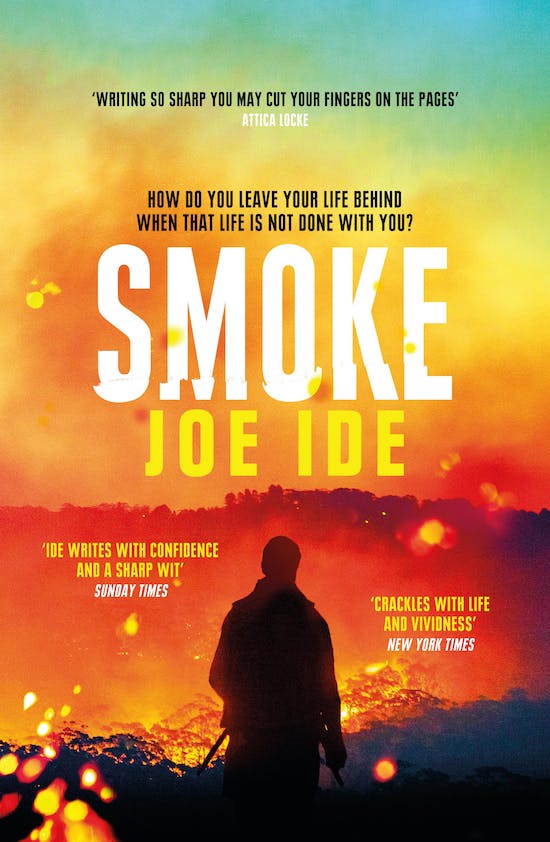
You sense that Joe Ide has been wondering how to keep his series hero fresh, too, as Smoke (Weidenfeld & Nicholson), the fifth book about Isiah Quintabe, finds the twenty-first-century Long Beach Sherlock heading for the hills – literally. It’s a canny move – taking IQ out of his local comfort zone and up into the mountains of central and northern California as the series, for the first time, tackles one of the genre’s staples (a serial killer). For a moment, as IQ idles by an alpine stream, you wonder whether Ide is going to attempt an echo of the most infamous Conan Doyle move of them all. But instead of a fight to the death with a fabled nemesis, Isiah experiences a solitary and life-affirming epiphany.
It’s an altogether more subtle form of character rebirth, and comes early in a book that ensures the reader will be back for the next one through the tried-and-trusted method of a gut-punch cliffhanger ending. Meanwhile, a well-worked running joke examines the generational divide provoked by hip hop, and one of Ide’s version of the Baker Street Irregulars turns up to expertly pilot a DJI Phantom.
There are many great things about these books, but among the more notable is the way Ide always keeps the reader on edge, the slick-talking humour, pop-culture savvy and sassy characters balanced at every juncture by enemies possessed of all too believable and terrifying malevolence. The serial killer here is a case in point: the crimes are repulsive, and the reader is forced to see them from inside the mind of the perpetrator – while also being shown that the monster is not an alien other, but an inevitable product of a broken-down system.
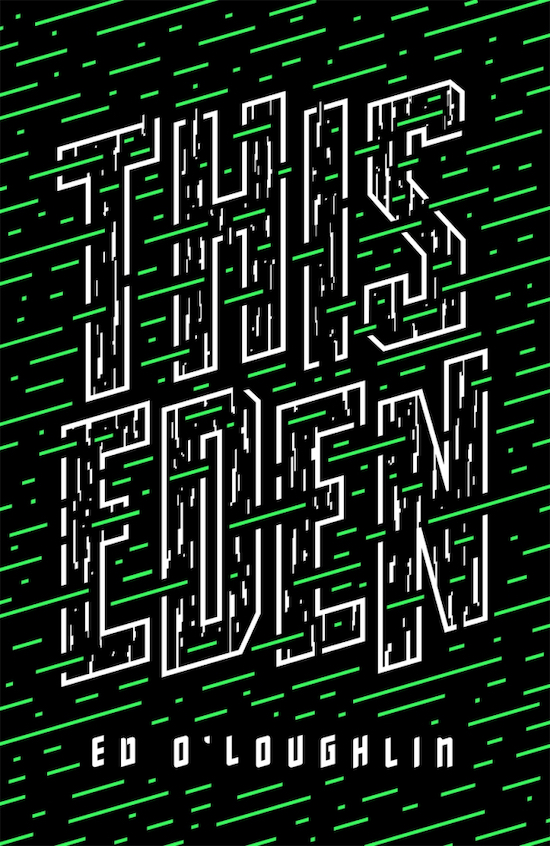
Another author whose pages come ripped from contemporary headlines is Ed O’Loughlin, whose This Eden (Riverrun) risks, at times, over-egging its socio-politically rich pudding. From smartphone surveillance to Stuxnet, cryptocurrency conspiracies to Gaza and Israel, from casting a Silicon Valley CEO as its most prominent likely villain to critiquing the way the tech industry has outsourced its tax liabilities to Ireland, he packs an almost indecent amount of zeitgeist-surfing detail, as his characters are flung around the globe on almost every form of vehicular transport you can think of. O’Loughlin even sets his climax in March 2020, incipient COVID lockdowns encircling his cast just like the antagonists they’re attempting to outfox. Yet he never writes in a way that suggests a lunging tilt for relevance. Rather, this immense accumulation of information acts as a series of nods and winks exchanged between writer and reader.
Similarly, his musical reference points range widely, and are lobbed about with glee: characters awaiting coded communication from an associate listen to Stereolab on an internet radio show, while in the final pages there’s an uncredited nod to The KLF and a hint that, if there’s ever to be a follow-up, at least one of the characters may spend the between-books interim locked down in the Curfew Tower in Cushendall. What makes the whole thing work is the evident fun O’Loughlin’s having moving all these pieces into alignment, and the way he manages to use them all without talking down to the reader or making you feel like he’s trying to teach you something you didn’t know.
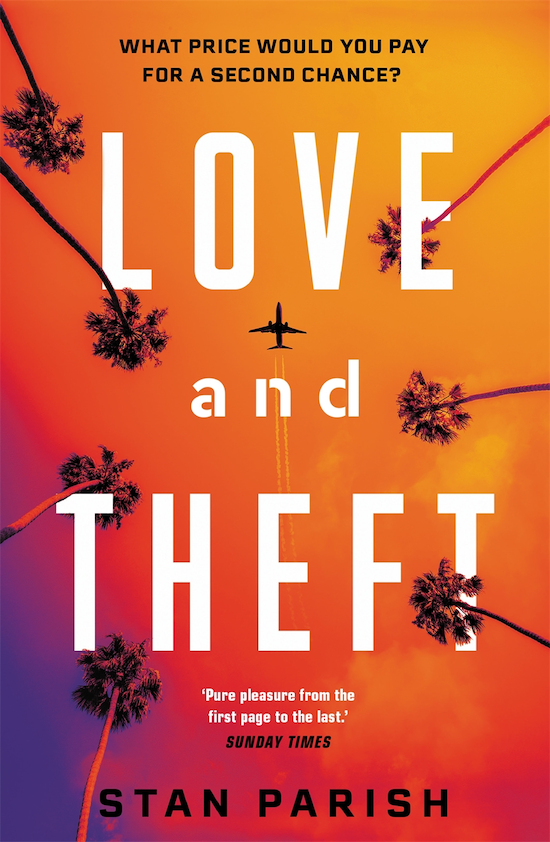
By comparison, Stan Parish’s characters end up with far fewer air miles, the itinerary of Love And Theft (Faber) numbering merely the eastern and western USA, Mexico (twice), and Spain. But he shares with O’Loughlin an interest not just in the destination but the journey, and although the narrative relies on a credulity-stretching coincidence fairly early on, he creates and sustains a dayglo demimonde of hip, young(ish) protagonists whose part-time criminality has finally caught up with them.
The milieu is reminiscent of the one Don Winslow built in Savages and The Kings Of Cool, and while Parish’s style is more conventional, he can still pack a punch, particularly in the dazzling opening: a gang on motorbikes rob a jewellery shop in a Las Vegas casino in a breathless series of staccato snapshot paragraphs written from multiple disparate viewpoints.
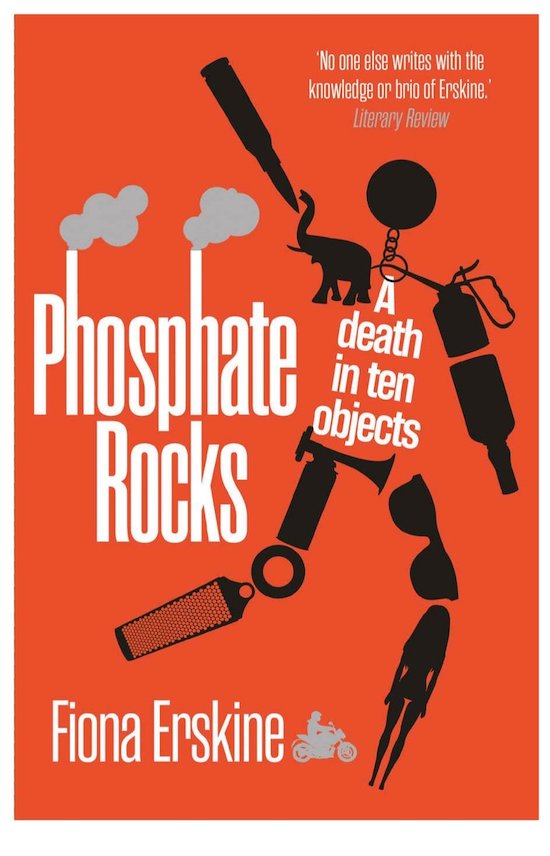
There aren’t many works of fiction that come with footnotes, fewer where those footnotes include the equations that describe chemical reactions, so we’re on fairly solid ground if we were to suggest that Fiona Erskine’s Phosphate Rocks (Sandstone Press) may be unique. It’s also a rare crime novel where the most serious breach of the law appears to be small-scale pilfering from a bonded warehouse. But there’s a dead body and a police investigation, so it still falls well within our remit.
A compound of fictionalised memoir, social and industrial history, chemistry textbook, and whowozit (as opposed to whodunnit), Phosphate Rocks takes more than a few risks, but there is a precise and scientific method to Erskine’s apparent madness. The point and the purpose here is less the mystery – which unspools gradually, as a witness and a detective discuss a series of objects found near a dead body, uncovered during the decommissioning of a defunct chemical plant – than the construction of a memorial to the real Edinburgh factory that Erskine worked at in the 1980s, the societal relevance of the work that was done there, and the people whose lives were bound up in and around it. Those who read crime fiction for the enjoyment of seeing if they can solve the crime before the author lets us in on it may not find this cleaves sufficiently closely to the genre’s rules; readers of conventional autobiography will struggle with the fictional framework Erskine uses to hang her sequence of vignettes within. But she succeeds brilliantly with what you sense was her main mission: rebuilding that plant, and giving its resurrected workforce a form of eternal life, in the mind of the reader.
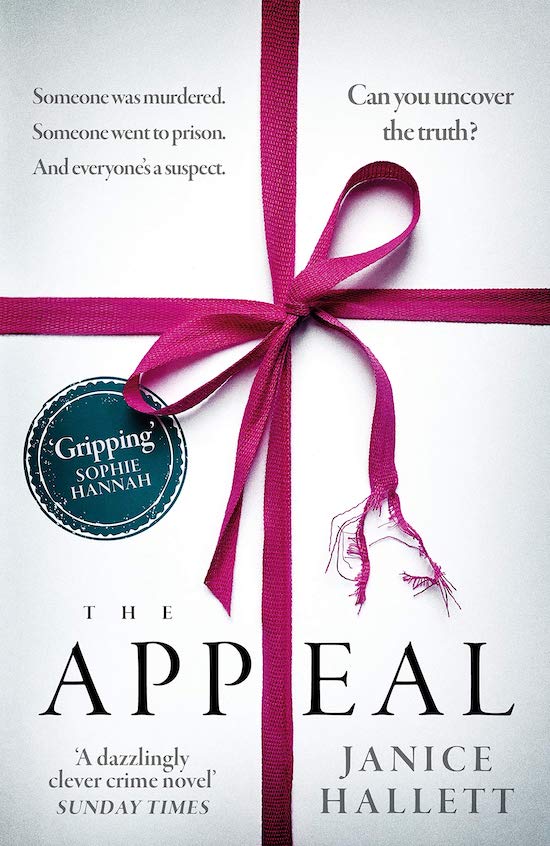
Another singular way of telling a story can be found in The Appeal (Viper), the first novel by playwright, screenwriter, former journalist and sometime political speechwriter Janice Hallett. The opening page is a letter from a barrister to two junior colleagues in his chambers, saying, in essence: “Here’s the case file, I need a second take on it, have a look through and tell me what you reckon”. The rest of the book is comprised of emails and text messages between and about a series of people associated with a small town’s amateur dramatics society. Every now and then the lawyers chip in on WhatsApp, acting as a kind of a Greek chorus, gently nudging the reader along, asking the same questions you’re raising as you proceed through the pages.
An episodic narrative using fragments of fictional found text is by no means unprecedented – to give just one relatively recent example, Graeme Macrae Burnet’s Booker-nominated His Bloody Project adopted a similar approach, albeit with documents of a more distant era – but Hallett’s take on it is daring and hugely successful. Her background in writing for stage and screen surely helps: this is a story told entirely in dialogue, yet somehow the world she conjures in the reader’s mind is as vivid and detailed as any that could have been created through conventional descriptive passages. The unusual structure also allows her to play hard and loose with the conventions of the genre: we know there’s been a crime, but we’re not just unclear who’s committed it, but even uncertain as to what it is, until a good two-thirds of the way through the book. Even better, right from the get-go Hallett forces us to tacitly admit there’s a guiltily voyeuristic thrill to reading someone else’s emails: that, coupled with the brevity of the passages (the longest are a couple of pages; the shortest a single word) makes it almost impossible to put down. Set aside a decent chunk of reading time: this is not one you’ll thank yourself for starting half an hour before bed.
Making the opposite transition, from page to screen, is Kotaro Isaka’s eleven-year-old Maria Bitoru. The book has become the first of his twenty-four novels to be translated into English thanks to an imminent film version. Within a very few pages it’s easy to see why David Leitch, the (uncredited) co-director of the first John Wick film, has been given the job of directing the Hollywood version of Bullet Train (Harvill Secker, translated by Sam Malissa). A Shinkansen speeding from Tokyo to Morioka is the venue for a series of murders, thefts, arguments, and fights involving several members of a group of professionally respectful but intensely competitive freelance criminals, who know each other by reputation if not always by sight.
Characters are sometimes close to being caricatures: the duo Lemon and Tangerine are a study in teeteringly balanced opposites, one knowing it’s a waste of time vocalising a reference to Anna Karenina when his partner insists on seeing everything in life through the prism of Thomas And Friends. Next year’s film inevitably sees more western faces on this particular Japanese train than Isaka has written here, but you get the feeling he was imagining it on the silver screen as he was writing it. This propulsive novel tauntingly flaunts its cinematic bona fides, one character even evoking Under Siege 2 as it speeds to a satisfyingly droll conclusion.

And we stay in Japan – and very much on the rails – for the last of our first selection of books, the long-awaited culmination of David Peace’s Tokyo trilogy. The thick end of ten years in the writing, Toky Redux (Faber) more than repays the reader’s patience. Across three sections set in different timeframes, Peace recreates and re-investigates the real-life death, in 1947, of the president of Japan’s state-run railway – sometimes cited as the nation’s equivalent of the JFK assassination: an incident seared on the public consciousness that has accrued similar degrees of intrigue and speculation down the years.
If you’ve read Peace before you’ll not be surprised by the style, but what’s striking here is the precise and deliberate ends to which what can at first seem an uneven or deliberately discomfiting approach is directed. The characters are described repeatedly carrying out personal daily tasks in a manner some readers will doubtless find obscurantist or irritating: but by this steady drip-feeding of accumulated detail, Peace builds a world at once real and deeply mysterious – each phrase a mote of dust that settles onto the surface of an increasingly occluded and contested history.
Comparisons between Peace and James Ellroy are so frequent as to be cliched, but it’s fascinating that both men have chosen, in their most recent work, to approach similar subjects – Japan and Japanese people, in the immediate aftermath of World War Two – from their respective vantage points on opposite edges of the Pacific Rim, and through fusing fiction with verifiable historical facts. Ellroy has two more books to go before completing his second LA quartet. The third in that series will, we hope, be reviewed in the next of these columns. But here, Peace brings his trilogy to a close with magisterial quality, the final paragraphs not just tying the various strands together but doing so in a way that at once chills the spine and sends the spirit soaring.

